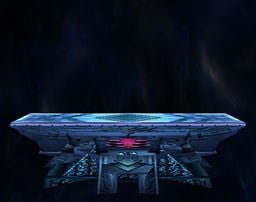Final Destination (SSBB)
| Final Destination | |
|---|---|
 Final Destination in Super Smash Bros. Brawl. 
| |
| Universe | Super Smash Bros. |
| Appears in | Brawl |
| Availability | Starter |
| Crate type | Futuristic |
| Tracks available | Final Destination Credits (Super Smash Bros.) Opening (Super Smash Bros. Melee) Final Destination (Melee) Giga Bowser (Melee) Bolded tracks must be unlocked |
Final Destination (終点, Endpoint) is a stage in Super Smash Bros. Brawl. In Brawl, Final Destination flies through exquisitely detailed backgrounds such as a galaxy, a wormhole, a starry sky, and finally, a "lovely ocean view", among many in-between scenarios, similar to the one at the end of Subspace Emissary. Unlike in Melee, this stage is a starter in Brawl.
Master Hand (and, under certain conditions, Crazy Hand) will fight the player here when playing Classic Mode. Additionally, both Hands are fought here during Boss Battles Mode in separate battles.
The length of Final Destination is often used as a unit of measurement when describing attacks and/or techniques. For example, when comparing Link and Toon Link's Final Smashes, it is stated that Link's Final Smash covers the whole length of Final Destination while Toon Link's only covers half.
Stage layout
As in Melee, Final Destination is presented as a simple, flat stage with no environmental hazards or background dangers. Compared to the Melee rendition of the stage, the bottom side is more box shaped, the stage is somewhat smaller, and perhaps most notably the ceiling is somewhat lower. Also, rather than a wide platform, its layout looks more like a walkway. Because the stage is for the most part just like it was in Melee, many of the same combat tactics are employed, with grounded and projectile combat being given an edge on the stage. Characters without projectiles are often forced to go on the offensive against those with projectiles to negate the range advantage that said projectiles give. It is possible to stage jump from either ledge with some characters.
Lucario wall clinging on the wall section underneath the right ledge of the stage.
In competitive play
Final Destination, due to its simple design and lack of disruptive features, has always been considered to be one of the fairest stages, and is usually a starter stage.
Final Destination's flat layout favors characters with projectiles such as Falco and Pit, since the opponent does not have any platforms they can use to jump on. The stage's large size makes KOing more difficult than on smaller stages such as Smashville, especially vertically. The large size also allows King Dedede to chain throw opponents more than he can on smaller stages. The stage lips are notorious for causing some characters' recoveries to be "caught" in them, which can cause them to miss the ledge sweetspot. The stage lips also allow stage spikes, such as Donkey Kong's forward throw, that send the opponent vertically downward if they don't tech.
Backgrounds
Trivia
- Brawl's Final Destination was the first one whose surface is not in the shape of an octagon (especially if one ignores the thin panels on either side of the stage).
- This is also the only non-Melee stage to have only one starting track in My Music.
- While all other unlockable characters (when unlocking) take place on a stage from their respective universe if The Subspace Emissary method is not used, Ganondorf (who is the exception) takes place on this stage when unlocking him with the Hidden Mountain & Forest music which normally doesn't play on Final Destination. This is the only time a playable character has a home stage on a Super Smash Bros. universe stage (Final Destination); only as an unlockable character and taking place when unlocking.
External links
- Final Destination on the DOJO!!!.
- Multiple characters performing the Final Destination jump
- Another video of characters doing the jump
- Marth performing the jump






